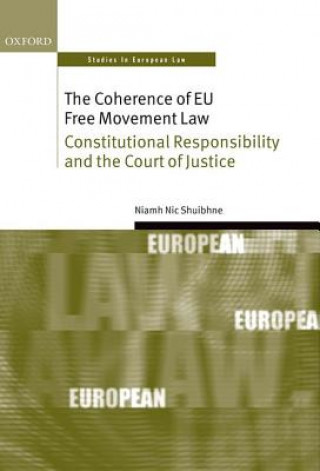
Livrare
Consilier de cumpărături





Nu se pretează? Nu contează! La noi puteți returna bunurile în 30 de zile
 Voucher cadou
orice valoare
Voucher cadou
orice valoare
Cu un voucher cadou nu veți da greș. În schimbul voucherului, destinatarul își poate alege orice din oferta noastră.
Coherence of EU Free Movement Law
 engleză
engleză
 502 b
502 b
30 de zile pentru retur bunuri
Ar putea de asemenea, să te intereseze


At the heart of the European Union is the establishment of a European market grounded in the free movement of people, goods, services, and capital. The implementation of the free market has preoccupied European lawyers since the inception of the Union's predecessors. Throughout the Union's development, as obstacles to free movement have been challenged in the courts, the European Court of Justice has had to expand on the internal market provisions in the founding Treaties to create a body of law determining the scope and meaning of the EU protection of free movement. In doing so, the Court has often taken differing approaches across the different freedoms, leaving a body of law apparently lacking a coherent set of foundational principles. This book presents a critical analysis of the European Courts' jurisprudence on free movement, examining the Court's constitutional responsibility to articulate a coherent vision of the EU internal market. Through analysis of restrictions on free movement rights, it argues that four main drivers are distorting the system of the case law and its claims to coherence. The drivers reflect 'good' impulses (the protection of fundamental rights); avoidable habits (the proliferation of principles and conflicting lines of case law authority); inherent ambiguities (the unsettled purpose and objectives of the internal market); and broader systemic conditions (the structure of the Court and its decision-making processes). These dynamics cause problematic instances of case law fragmentation - which has substantive implications for citizens, businesses, and Member States participating in the internal market as well as reputational consequences for the Court of Justice and for the EU more generally. However, ultimately the Member States must take greater responsibility too: only they can ensure that the Court of Justice is properly structured and supported, enabling it to play its critical institutional part in the complex narrative of EU integration. Examining the judicial development of principles that define the scope of EU free movement law, this book argues that sustaining case law coherence is a vital constitutional responsibility of the Court of Justice. The idea of constitutional responsibility draws from the nature of the duties that a higher court owes to a constitutional text and to constitutional subjects. It is based on values of fairness, integrity, and imagination. A paradigm of case law coherence is less rigid, and therefore more realistic, than a benchmark of legal certainty. But it still takes seriously the Court's obligations as a high-level judicial institution bound by the rule of law. Judges can legitimately be expected - and obliged - to be aware of the public legal resource that they construct through the evolution of case law.
Informații despre carte
 engleză
engleză
Categorii




 Cum să cumpăr
Cum să cumpăr




























